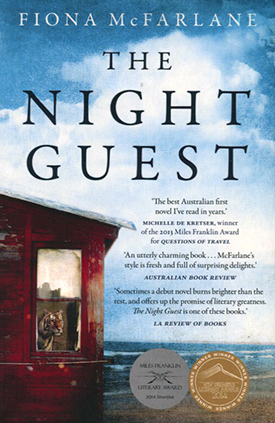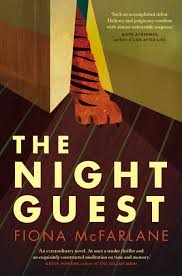 Much is made of the tiger in this novel, and that may have been a turn off for some readers, thinking this is magic realism in the vein of Life of Pi. I certainly thought so when I saw the cover for the first trade paperback edition with its cartoonish tiger’s paw peeking around a doorway. The new smaller paperback, that’s just come out, has a more mysterious, evocative cover, in keeping, I think, with the contents of this wonderful novel.
Much is made of the tiger in this novel, and that may have been a turn off for some readers, thinking this is magic realism in the vein of Life of Pi. I certainly thought so when I saw the cover for the first trade paperback edition with its cartoonish tiger’s paw peeking around a doorway. The new smaller paperback, that’s just come out, has a more mysterious, evocative cover, in keeping, I think, with the contents of this wonderful novel.
The tiger is a metaphor and doesn’t figure prominently but is a catalyst for much of the action. Ruth is an elderly widow left living alone, in an isolated beach house, having retired there with her late husband, Harry. Ruth is a beautifully-drawn character, tough in some ways but also vulnerable, and full of the memories of a childhood spent in Fiji with her missionary parents. In her isolation, these memories crowd back, especially at night when it seems the insects and hot, fetid atmosphere of Fiji crowds in.
Into Ruth’s self-contained world comes Frida— a large, forthright woman, maybe half-Fijian, maybe not—who says she’s ‘from the government’ and come to help out Ruth around the house. Ruth is surprised, but she has a bad back, and some assistance would be welcome. Frida then begins to insinuate herself into Ruth’s life and the power tussle between the two is played out, at first almost playfully and, as time goes by, a sinister note creeps in.
It is to McFarlane’s credit, and her skill at narrative, that this essentially two-character novel, is so riveting. Both Ruth and Frida are comic in their ways, but the drama of the book depends on us having access to Ruth’s thoughts—funny, sardonic, poignant—and to only know Frida by her actions and her words. But, she too, is funny—a force of nature with her energy and her quirks.
 The writing is also beautifully constructed, conveying with its tight prose and rich imagery, the depth and breadth of Ruth’s world:
The writing is also beautifully constructed, conveying with its tight prose and rich imagery, the depth and breadth of Ruth’s world:
Frida sat on the unfamiliar chair and looked at Ruth, impassive. Her obstinacy had a mineral quality. Ruth felt she could chip away at it with a sharp tool and reveal nothing more than the uniformity of its composition.
for example, or
Frida’s suitcase still sat on the sandy grass. It could convincingly have grown from a stalk into a grey-white fruit.
or the acute observation,
Ruth was sensitive to criticism of her father, in that tenuous and personal way in which children are anxious for the dignity of their parents. She worried a great deal for him out in the world.
The Night Guest is an affecting, psychological study with a surprisingly taut, suspenseful element lying somewhere between S J Watson’s thriller Before I Go to Sleep and Jessica Anderson’s wonderful Tirra Lirra by the River. In fact Nora Porteous, of the latter, has much in common with Ruth. Both are fantastic portrayals of older women looking back and assessing their lives, while struggling and dealing with the present.

